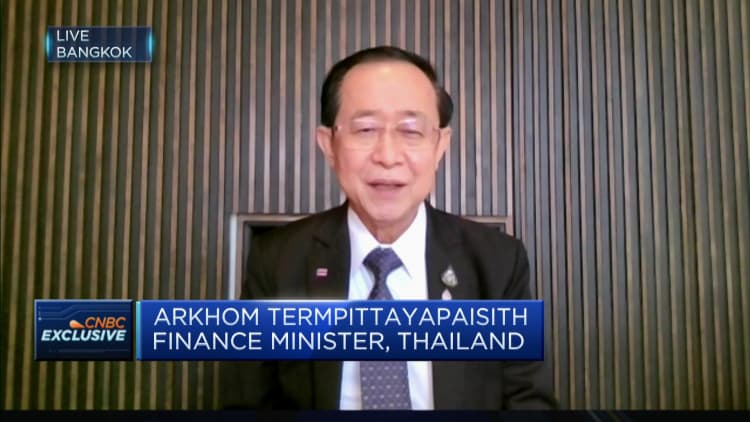
Arkhom Termpittayapaisith, Thailand’s finance minister, speaks at the meeting of finance ministers of the Asia-Pacific Economic Cooperation in Bangkok on Oct. 20, 2022.
Andre Malerba | Bloomberg | Getty Images
Asian economies are well-equipped to withstand economic headwinds next year, the U.S. Treasury said following the conclusion of the APEC Finance Ministers’ Meeting in Thailand last week.
During the two-day meeting, finance ministers in Asia-Pacific also pledged not to adjust exchange rates for competitive purposes, recognizing that “excessive volatility or disorderly movements in exchange rates can have adverse implications for economic and financial stability.”
Many Asian currencies have crumbled against the U.S. dollar as the Federal Reserve persists with interest rate hikes in an effort to combat inflation. Last week, the Japanese yen weakened past 150 against the U.S. dollar crossing a psychological level for the first time since August 1990.
Despite sluggishness in China and the the diversity of economic strengths among countries, Asia is well placed to tackle downturns ahead, U.S. Deputy Treasury Secretary Wally Adeyemo said during a press conference in Singapore on Friday.

“Ultimately, I have come away from APEC with a sense that the economies in this region have the tools to manage through the headwinds that they face,” Adeyemo said following the APEC meeting.
“Spending time in Asia is the best possible reminder of the vitality of the region’s economy as well as its increasing centrality.”
Adeyemo said in line with the Indo-Pacific Economic Framework, he had used his time in Asia to move toward the U.S.’s goal of being more economically integrated with Asia. He added that U.S. legislation such as the CHIPS Act could help the region generate economic activity.
“Put simply, we are positioning the U.S. to be the preferred economic partner for countries like Singapore and others who have joined IPEF as well as for other economies in the world,” he said.
“Ultimately I have come away from with a sense that the economies in this region have the tools to manage through the headwinds that they face”: Wally Adeyemo
Bloomberg | Bloomberg | Getty Images
On IPEF — the U.S.-led framework for economic and trade matters in the region — Adeyemo said he has had discussions with various countries which have agreed to participate in some of the framework’s four modules of trade, supply chain, clean economy and fair economy.
The U.S. has recently engaged with different members of the framework including India, Indonesia and Singapore although it also drew criticism for the secrecy of the deals struck with members.
During the APEC meeting, member countries also agreed to use all available policy tools including monetary, fiscal and structural to manage inflationary pressures, the chair’s statement said.
Some economies acknowledged the importance of improving debt transparency while others pointed to the impact of tightening economic conditions that could lead to debt distress.
